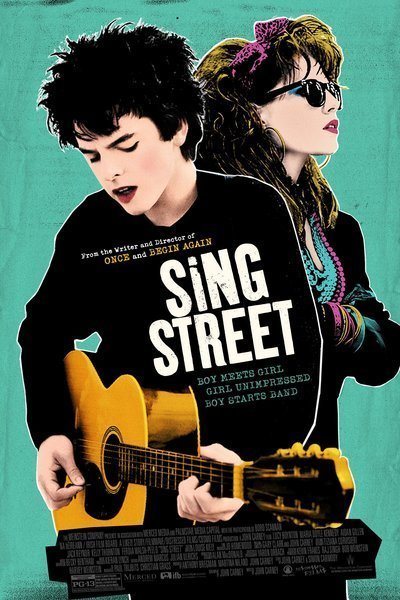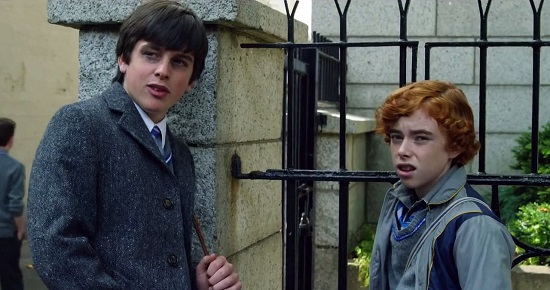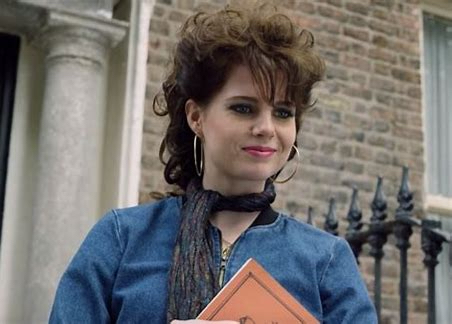Week of March 15 – 21, 2020
An Irish coming-of-age story with music at its core is my third choice as a movie to curl up with while having to remain at home. Sing Street may not be as good as John Carney’s earlier films, Once (2007) or Begin Again (2013), but it is even more exuberant and joyful. There is a long tradition of movies with characters creating music or performing to overcome their problems, dating back to the 1930s and those hokey “let’s put on a show!” backyard extravaganzas. They had the right idea, even if they are extremely dated now. Carney’s Sing Street updates the formula to the 1980s and populates it with popular songs of the era, as well as new music which brilliantly reflects the era.

Interestingly, Carney sets his story in 1985 Dublin, at a Catholic school that mirrors his own experience as a teenager, where he was bullied and mocked. His protagonist is Conor Lawlor (Ferdia Walsh-Peelo), a young man forced to transfer to the new school due to his family’s financial issues. Conor doesn’t fit well into the school but finds a friend in Darren (Ben Carolin), and spies an older girl outside the school who piques his interest. When he talks to Raphina (Lucy Boynton) and she tells him that she is a model, he impulsively asks her to be in his band’s videos. She gives Conor her number and Conor immediately sets out to form a band!
Within a few weeks, with Darren’s help, Conor has recruited a band, and has written a song, “The Riddle of the Model,” for them to record. Conor’s writing partner is Eamon (Mark McKenna), who can seemingly play any instrument, and do it well. Eamon is the film’s best secondary character, a guy who doesn’t need the spotlight but just wants to make music, even if it is in a pop band. He’s always ready to write new material, and he always supports Conor’s sometimes “bold choices”. With a guitarist, a drummer and a keyboardist joining bass guitarist Eamon and singer Conor, the stage is set for the debut of a new band — “Sing Street”, to be managed by Darren.
No doubt you’ve seen this kind of story before. Misfit kids get together and rebel and have a good time and make a difference in some way. It works! This has become an archetype because when it is done well, it really packs a punch. Sing Street, an etymological word play on the Dublin school located on Synge Street, works so beautifully for several reasons. First, the teens are troubled; at least, their home lives are. Most great teenage stories come with a foundation of trouble or angst, with divorce, or addiction, or neglect forcing them to become adults too soon, to escape. Next, they are talented. The miracle of Sing Street is that the band is actually good. It’s too soon, and they are too young, but it doesn’t matter. The band’s songs, carefully crafted by Gary Clark and director John Carney, are perfect for them to learn and play, faithfully mirror the popular songs of the time, and make fun videos to watch.

The first song, “The Riddle of the Model,” is really an experiment, depicting how Conor and Eamon work together to merge Conor’s lyrics to Eamon’s gift for melody and intriguing riffs. Then they make the video, which is a disaster, but a fun disaster, as they are learning as they go along. The second song, “A Beautiful Sea,” is brilliantly conceived, showing how the song progresses from two guys just trying to create something nice to a song progressively evolving as the other band members join in and find their own ways to contribute. Carney did something similar in Begin Again, when Mark Ruffalo’s character listens to a Keira Knightley song and then imagines how orchestration could improve it — I am dazzled by such displays of originality. Filmmakers usually struggle showing how people create when they write; here, the music does half the work and Carney does the rest. The creative process at work is true magic, and nobody conveys it better than John Carney.
It’s a joyful process, and the characters find it to be so. Making music improves their lives. Performing music gives them purpose. The other students begin to respect them. Even the brutal headmaster, Brother Baxter (Don Wycherly), is pleased that they are doing something non-destructive. Things are still bad, but the music helps everyone cope and get through it. That’s the heart of the movie; that no matter how bad, music and artistic expression can — and must — be present to help people through the bad times. Because it will help. It always has, and does, if one lets it.

Adding to the verisimilitude of the piece is Conor’s acerbic brother Brendan (Jack Reynor), a dropout living at home who seemingly has no bright future, but is happy to advise Conor on all things music- and romance-related. His advice guides Conor very well, though Brendan is unable of truly helping himself. He has one great monologue where he tries to explain his situation to Conor, but we’re not really sure if Conor understands his older brother’s predicament.
The film also carries the undercurrent, rightly or wrongly, that things are probably better elsewhere. Raphina dreams of going to London to model professionally. Conor eventually decides to go to London to try to find the band a real record deal. Large obstacles, including the very real threat of death, threaten these characters’ longings, but eventually they try, together. And the story ends with hope.
Joy and hope are hard to come by, and this movie carries both of those emotions, in spades. Despite the poverty and parental problems, this film is full of joy and spirit. Instead of avoiding trouble, these young characters try to confront it and outwit it — note how they deal with Barry the bully. It is a coming-of-age story with real power, imagination and sweetness. I think it is just the type of movie to help get us through these tough times. Others think so, too; “Sing Street” is set to open as a Broadway play in November! This delightful drama with music is available on DVD or as a streaming title. ☆ ☆ ☆ 1/2. Backdated to 15 March 2020.
Similar movies include A Hard Day’s Night (1964); That Thing You Do! (1996); Hustle and Flow (2005); Music and Lyrics (2007); Once (2007); Begin Again (2013); and Bohemian Rhapsody (2018).
